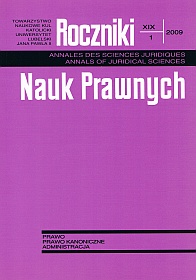Wyłączenie od dziedziczenia a krąg osób uprawnionych do spadkobrania
Abstrakt
The issue of deprivation of the right to inheritance (i.e. excluding an heir from succession) is extremely complex. Due to its legal effects taking place in every case of exclusion from succession and their impact on the circle of the persons who are entitled to an inheritance, the issue has both theoretical and practical significance. Acts of law, regulated by the Civil Code, which result in an exclusion from succession include: a judicial decision that recognises an heir as unworthy (Art. 928 para 2 of the Code), or a decision that excludes the testator’s spouse from succession (Art. 940), declaration by an heir rejecting an inheritance (Art. 1020) and an agreement between the testator and lawful heir disclaiming succession (Art. 1049 para 2). Only negative testament remains unregulated by the Code, being accounted for in a decree on inheritance law of 8 Oct 1946. Despite the lack of statutory regulation, the admissibility of such a testament is unquestioned. Exclusion from succession can occur either by way of a judicial decision or as a result of a legal act by the testator, inheritor or both. In both of these cases occurs legal fiction, according to which the excluded subject is treated as if he or she had not lived to the opening of the inheritance, thus disabling them from gaining any benefit from the inheritance and in consequence altering the circle of persons entitled to a particular inheritance.
Copyright (c) 2009 Roczniki Nauk Prawnych

Utwór dostępny jest na licencji Creative Commons Uznanie autorstwa – Użycie niekomercyjne – Bez utworów zależnych 4.0 Międzynarodowe.


